Comprehensive Responses: Healthcare Sector Discussion Posts Analysis
VerifiedAdded on 2022/11/14
|8
|2264
|148
Discussion Board Post
AI Summary
This assignment comprises a student's detailed responses to multiple discussion posts centered around the healthcare sector. The responses cover a wide array of topics, including the evolving landscape of healthcare, the role of nurses in patient care and education, and the importance of ethical standards in nursing practice. The student engages with discussions on managed care models, exploring their advantages, disadvantages, and impact on healthcare costs and access. Furthermore, the responses delve into employer-sponsored health insurance policies, comparing them with private insurance options and discussing the implications of the Affordable Care Act (ACA). The student references various scholarly articles and research papers to support their arguments and provide evidence-based insights into the complex issues discussed. The assignment reflects a comprehensive understanding of the healthcare system and its various facets.
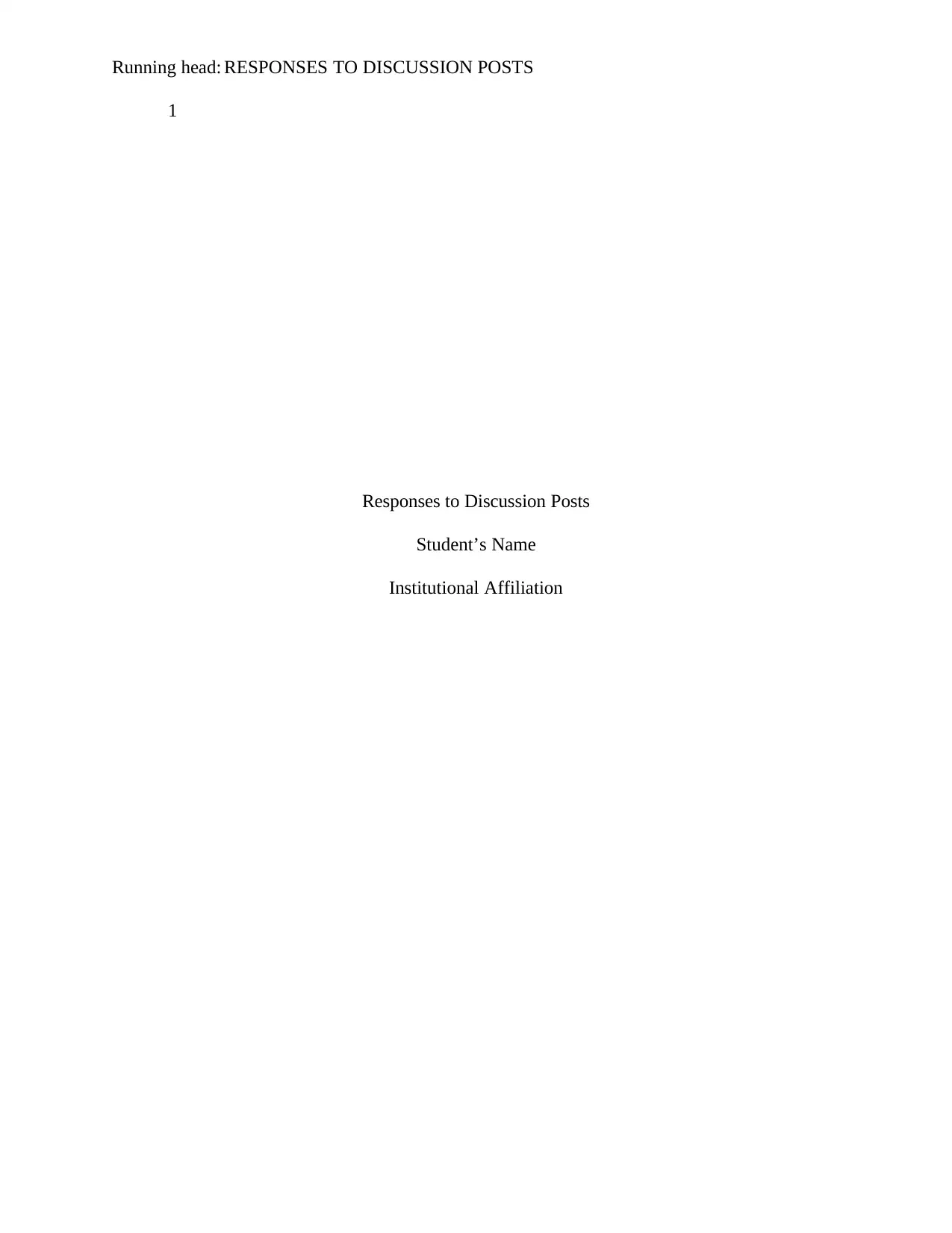
Running head: RESPONSES TO DISCUSSION POSTS
1
Responses to Discussion Posts
Student’s Name
Institutional Affiliation
1
Responses to Discussion Posts
Student’s Name
Institutional Affiliation
Paraphrase This Document
Need a fresh take? Get an instant paraphrase of this document with our AI Paraphraser
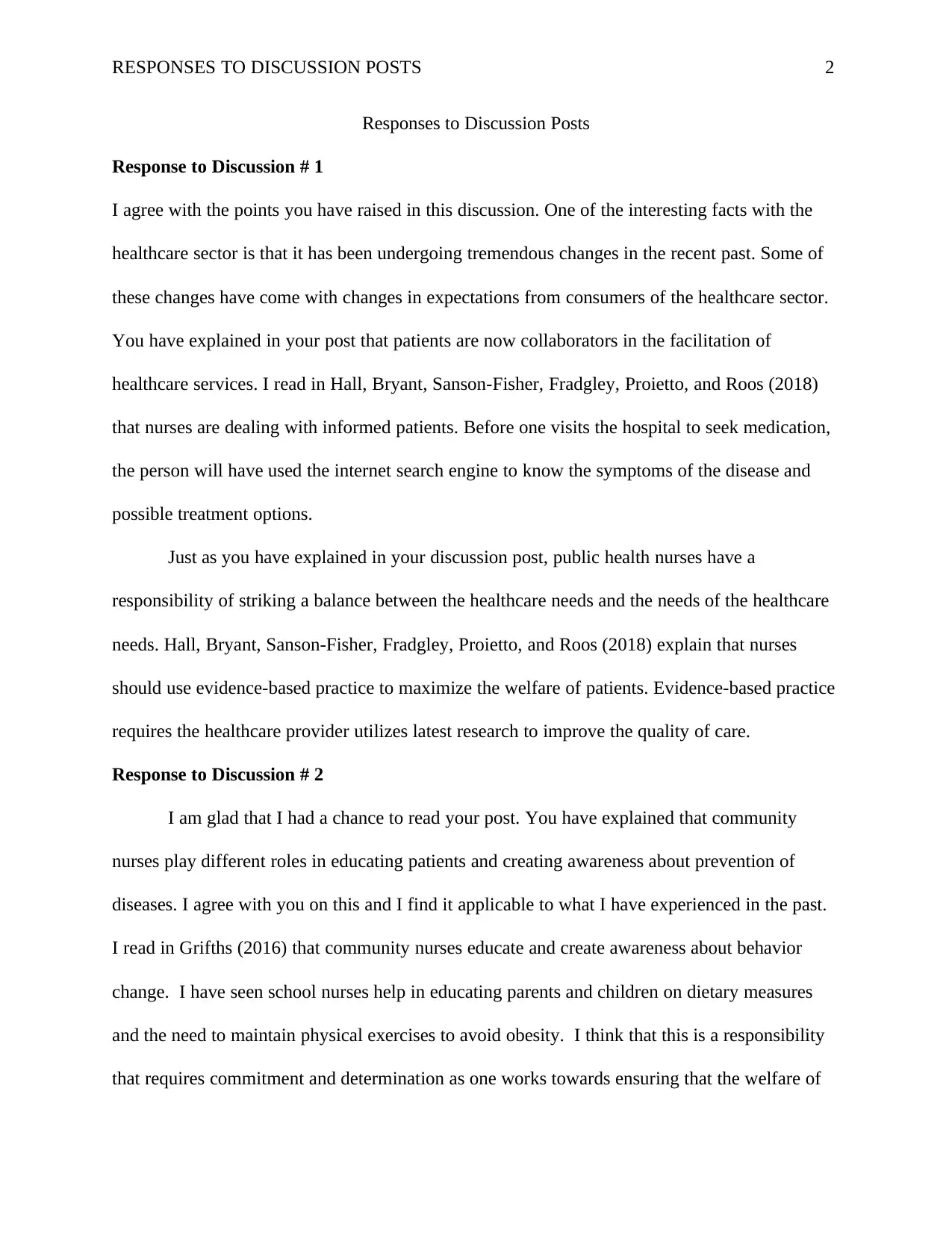
RESPONSES TO DISCUSSION POSTS 2
Responses to Discussion Posts
Response to Discussion # 1
I agree with the points you have raised in this discussion. One of the interesting facts with the
healthcare sector is that it has been undergoing tremendous changes in the recent past. Some of
these changes have come with changes in expectations from consumers of the healthcare sector.
You have explained in your post that patients are now collaborators in the facilitation of
healthcare services. I read in Hall, Bryant, Sanson-Fisher, Fradgley, Proietto, and Roos (2018)
that nurses are dealing with informed patients. Before one visits the hospital to seek medication,
the person will have used the internet search engine to know the symptoms of the disease and
possible treatment options.
Just as you have explained in your discussion post, public health nurses have a
responsibility of striking a balance between the healthcare needs and the needs of the healthcare
needs. Hall, Bryant, Sanson-Fisher, Fradgley, Proietto, and Roos (2018) explain that nurses
should use evidence-based practice to maximize the welfare of patients. Evidence-based practice
requires the healthcare provider utilizes latest research to improve the quality of care.
Response to Discussion # 2
I am glad that I had a chance to read your post. You have explained that community
nurses play different roles in educating patients and creating awareness about prevention of
diseases. I agree with you on this and I find it applicable to what I have experienced in the past.
I read in Grifths (2016) that community nurses educate and create awareness about behavior
change. I have seen school nurses help in educating parents and children on dietary measures
and the need to maintain physical exercises to avoid obesity. I think that this is a responsibility
that requires commitment and determination as one works towards ensuring that the welfare of
Responses to Discussion Posts
Response to Discussion # 1
I agree with the points you have raised in this discussion. One of the interesting facts with the
healthcare sector is that it has been undergoing tremendous changes in the recent past. Some of
these changes have come with changes in expectations from consumers of the healthcare sector.
You have explained in your post that patients are now collaborators in the facilitation of
healthcare services. I read in Hall, Bryant, Sanson-Fisher, Fradgley, Proietto, and Roos (2018)
that nurses are dealing with informed patients. Before one visits the hospital to seek medication,
the person will have used the internet search engine to know the symptoms of the disease and
possible treatment options.
Just as you have explained in your discussion post, public health nurses have a
responsibility of striking a balance between the healthcare needs and the needs of the healthcare
needs. Hall, Bryant, Sanson-Fisher, Fradgley, Proietto, and Roos (2018) explain that nurses
should use evidence-based practice to maximize the welfare of patients. Evidence-based practice
requires the healthcare provider utilizes latest research to improve the quality of care.
Response to Discussion # 2
I am glad that I had a chance to read your post. You have explained that community
nurses play different roles in educating patients and creating awareness about prevention of
diseases. I agree with you on this and I find it applicable to what I have experienced in the past.
I read in Grifths (2016) that community nurses educate and create awareness about behavior
change. I have seen school nurses help in educating parents and children on dietary measures
and the need to maintain physical exercises to avoid obesity. I think that this is a responsibility
that requires commitment and determination as one works towards ensuring that the welfare of
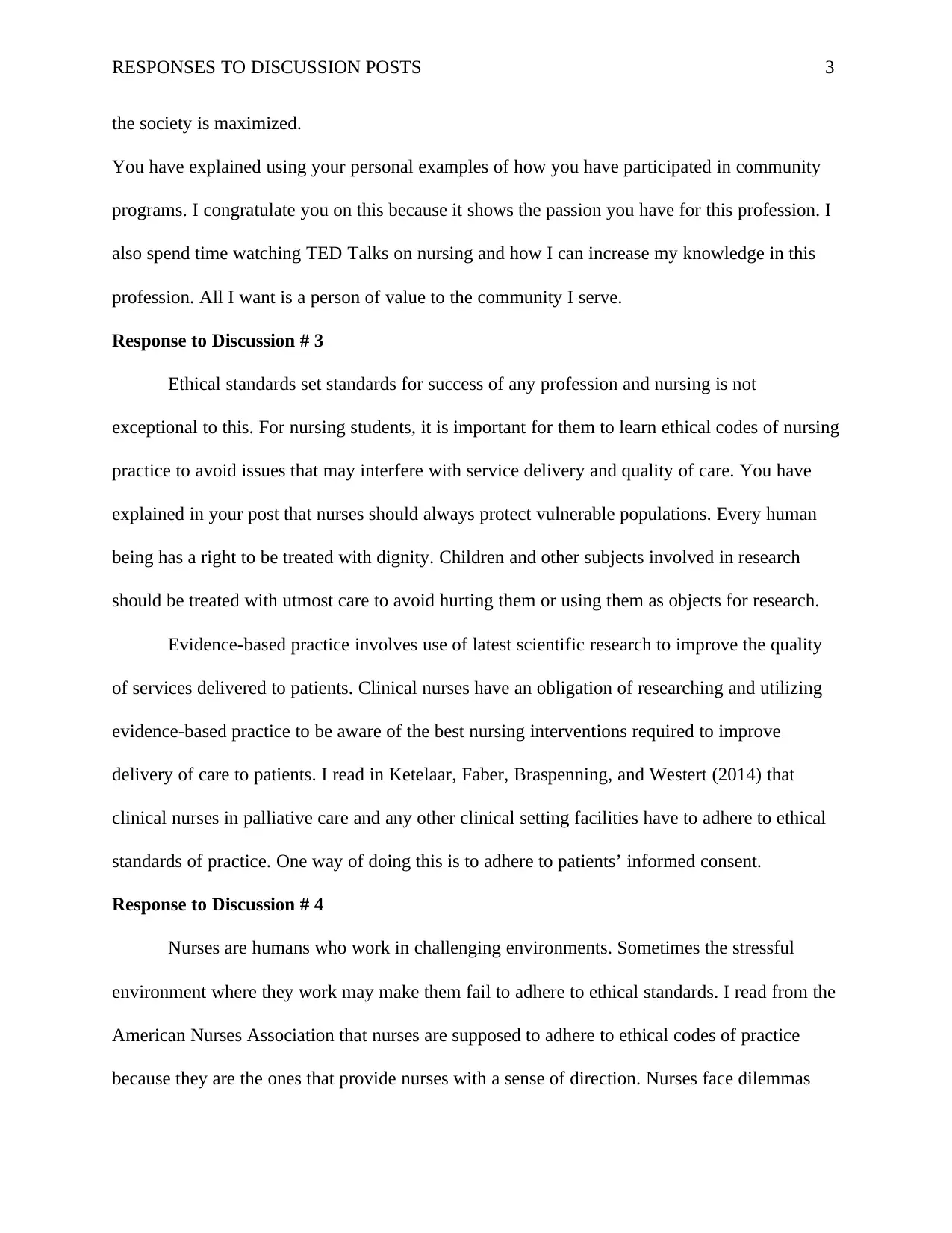
RESPONSES TO DISCUSSION POSTS 3
the society is maximized.
You have explained using your personal examples of how you have participated in community
programs. I congratulate you on this because it shows the passion you have for this profession. I
also spend time watching TED Talks on nursing and how I can increase my knowledge in this
profession. All I want is a person of value to the community I serve.
Response to Discussion # 3
Ethical standards set standards for success of any profession and nursing is not
exceptional to this. For nursing students, it is important for them to learn ethical codes of nursing
practice to avoid issues that may interfere with service delivery and quality of care. You have
explained in your post that nurses should always protect vulnerable populations. Every human
being has a right to be treated with dignity. Children and other subjects involved in research
should be treated with utmost care to avoid hurting them or using them as objects for research.
Evidence-based practice involves use of latest scientific research to improve the quality
of services delivered to patients. Clinical nurses have an obligation of researching and utilizing
evidence-based practice to be aware of the best nursing interventions required to improve
delivery of care to patients. I read in Ketelaar, Faber, Braspenning, and Westert (2014) that
clinical nurses in palliative care and any other clinical setting facilities have to adhere to ethical
standards of practice. One way of doing this is to adhere to patients’ informed consent.
Response to Discussion # 4
Nurses are humans who work in challenging environments. Sometimes the stressful
environment where they work may make them fail to adhere to ethical standards. I read from the
American Nurses Association that nurses are supposed to adhere to ethical codes of practice
because they are the ones that provide nurses with a sense of direction. Nurses face dilemmas
the society is maximized.
You have explained using your personal examples of how you have participated in community
programs. I congratulate you on this because it shows the passion you have for this profession. I
also spend time watching TED Talks on nursing and how I can increase my knowledge in this
profession. All I want is a person of value to the community I serve.
Response to Discussion # 3
Ethical standards set standards for success of any profession and nursing is not
exceptional to this. For nursing students, it is important for them to learn ethical codes of nursing
practice to avoid issues that may interfere with service delivery and quality of care. You have
explained in your post that nurses should always protect vulnerable populations. Every human
being has a right to be treated with dignity. Children and other subjects involved in research
should be treated with utmost care to avoid hurting them or using them as objects for research.
Evidence-based practice involves use of latest scientific research to improve the quality
of services delivered to patients. Clinical nurses have an obligation of researching and utilizing
evidence-based practice to be aware of the best nursing interventions required to improve
delivery of care to patients. I read in Ketelaar, Faber, Braspenning, and Westert (2014) that
clinical nurses in palliative care and any other clinical setting facilities have to adhere to ethical
standards of practice. One way of doing this is to adhere to patients’ informed consent.
Response to Discussion # 4
Nurses are humans who work in challenging environments. Sometimes the stressful
environment where they work may make them fail to adhere to ethical standards. I read from the
American Nurses Association that nurses are supposed to adhere to ethical codes of practice
because they are the ones that provide nurses with a sense of direction. Nurses face dilemmas
⊘ This is a preview!⊘
Do you want full access?
Subscribe today to unlock all pages.

Trusted by 1+ million students worldwide
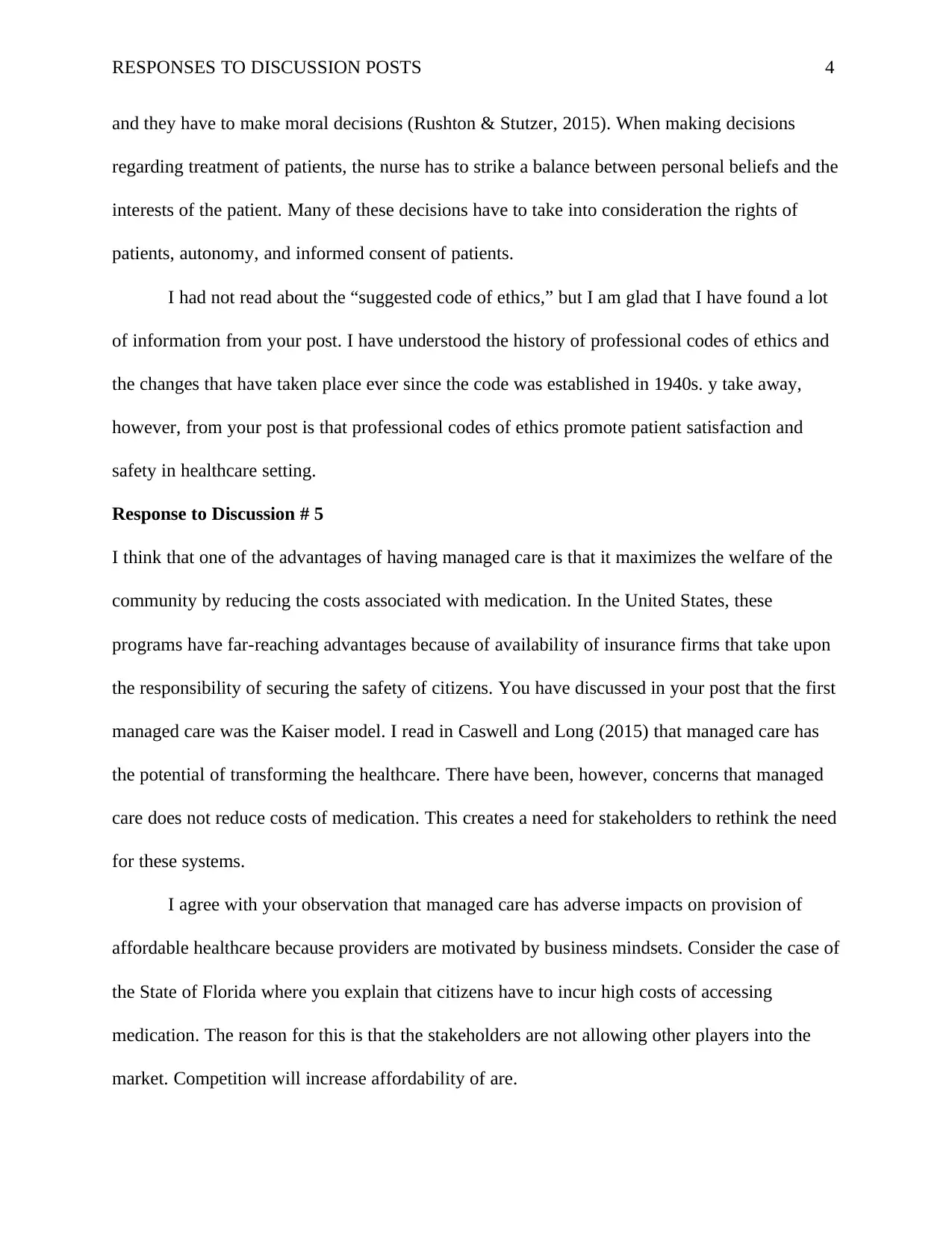
RESPONSES TO DISCUSSION POSTS 4
and they have to make moral decisions (Rushton & Stutzer, 2015). When making decisions
regarding treatment of patients, the nurse has to strike a balance between personal beliefs and the
interests of the patient. Many of these decisions have to take into consideration the rights of
patients, autonomy, and informed consent of patients.
I had not read about the “suggested code of ethics,” but I am glad that I have found a lot
of information from your post. I have understood the history of professional codes of ethics and
the changes that have taken place ever since the code was established in 1940s. y take away,
however, from your post is that professional codes of ethics promote patient satisfaction and
safety in healthcare setting.
Response to Discussion # 5
I think that one of the advantages of having managed care is that it maximizes the welfare of the
community by reducing the costs associated with medication. In the United States, these
programs have far-reaching advantages because of availability of insurance firms that take upon
the responsibility of securing the safety of citizens. You have discussed in your post that the first
managed care was the Kaiser model. I read in Caswell and Long (2015) that managed care has
the potential of transforming the healthcare. There have been, however, concerns that managed
care does not reduce costs of medication. This creates a need for stakeholders to rethink the need
for these systems.
I agree with your observation that managed care has adverse impacts on provision of
affordable healthcare because providers are motivated by business mindsets. Consider the case of
the State of Florida where you explain that citizens have to incur high costs of accessing
medication. The reason for this is that the stakeholders are not allowing other players into the
market. Competition will increase affordability of are.
and they have to make moral decisions (Rushton & Stutzer, 2015). When making decisions
regarding treatment of patients, the nurse has to strike a balance between personal beliefs and the
interests of the patient. Many of these decisions have to take into consideration the rights of
patients, autonomy, and informed consent of patients.
I had not read about the “suggested code of ethics,” but I am glad that I have found a lot
of information from your post. I have understood the history of professional codes of ethics and
the changes that have taken place ever since the code was established in 1940s. y take away,
however, from your post is that professional codes of ethics promote patient satisfaction and
safety in healthcare setting.
Response to Discussion # 5
I think that one of the advantages of having managed care is that it maximizes the welfare of the
community by reducing the costs associated with medication. In the United States, these
programs have far-reaching advantages because of availability of insurance firms that take upon
the responsibility of securing the safety of citizens. You have discussed in your post that the first
managed care was the Kaiser model. I read in Caswell and Long (2015) that managed care has
the potential of transforming the healthcare. There have been, however, concerns that managed
care does not reduce costs of medication. This creates a need for stakeholders to rethink the need
for these systems.
I agree with your observation that managed care has adverse impacts on provision of
affordable healthcare because providers are motivated by business mindsets. Consider the case of
the State of Florida where you explain that citizens have to incur high costs of accessing
medication. The reason for this is that the stakeholders are not allowing other players into the
market. Competition will increase affordability of are.
Paraphrase This Document
Need a fresh take? Get an instant paraphrase of this document with our AI Paraphraser
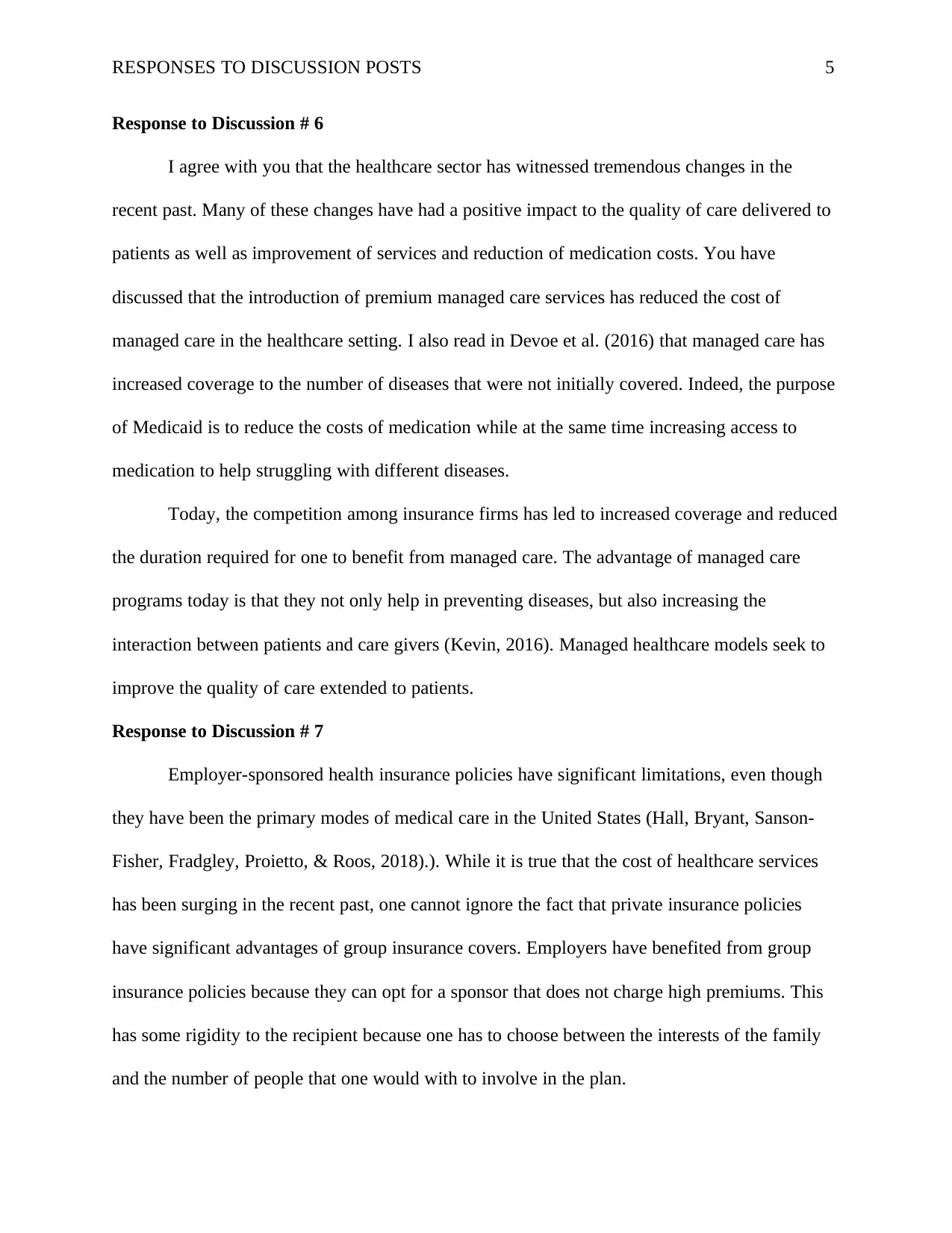
RESPONSES TO DISCUSSION POSTS 5
Response to Discussion # 6
I agree with you that the healthcare sector has witnessed tremendous changes in the
recent past. Many of these changes have had a positive impact to the quality of care delivered to
patients as well as improvement of services and reduction of medication costs. You have
discussed that the introduction of premium managed care services has reduced the cost of
managed care in the healthcare setting. I also read in Devoe et al. (2016) that managed care has
increased coverage to the number of diseases that were not initially covered. Indeed, the purpose
of Medicaid is to reduce the costs of medication while at the same time increasing access to
medication to help struggling with different diseases.
Today, the competition among insurance firms has led to increased coverage and reduced
the duration required for one to benefit from managed care. The advantage of managed care
programs today is that they not only help in preventing diseases, but also increasing the
interaction between patients and care givers (Kevin, 2016). Managed healthcare models seek to
improve the quality of care extended to patients.
Response to Discussion # 7
Employer-sponsored health insurance policies have significant limitations, even though
they have been the primary modes of medical care in the United States (Hall, Bryant, Sanson-
Fisher, Fradgley, Proietto, & Roos, 2018).). While it is true that the cost of healthcare services
has been surging in the recent past, one cannot ignore the fact that private insurance policies
have significant advantages of group insurance covers. Employers have benefited from group
insurance policies because they can opt for a sponsor that does not charge high premiums. This
has some rigidity to the recipient because one has to choose between the interests of the family
and the number of people that one would with to involve in the plan.
Response to Discussion # 6
I agree with you that the healthcare sector has witnessed tremendous changes in the
recent past. Many of these changes have had a positive impact to the quality of care delivered to
patients as well as improvement of services and reduction of medication costs. You have
discussed that the introduction of premium managed care services has reduced the cost of
managed care in the healthcare setting. I also read in Devoe et al. (2016) that managed care has
increased coverage to the number of diseases that were not initially covered. Indeed, the purpose
of Medicaid is to reduce the costs of medication while at the same time increasing access to
medication to help struggling with different diseases.
Today, the competition among insurance firms has led to increased coverage and reduced
the duration required for one to benefit from managed care. The advantage of managed care
programs today is that they not only help in preventing diseases, but also increasing the
interaction between patients and care givers (Kevin, 2016). Managed healthcare models seek to
improve the quality of care extended to patients.
Response to Discussion # 7
Employer-sponsored health insurance policies have significant limitations, even though
they have been the primary modes of medical care in the United States (Hall, Bryant, Sanson-
Fisher, Fradgley, Proietto, & Roos, 2018).). While it is true that the cost of healthcare services
has been surging in the recent past, one cannot ignore the fact that private insurance policies
have significant advantages of group insurance covers. Employers have benefited from group
insurance policies because they can opt for a sponsor that does not charge high premiums. This
has some rigidity to the recipient because one has to choose between the interests of the family
and the number of people that one would with to involve in the plan.
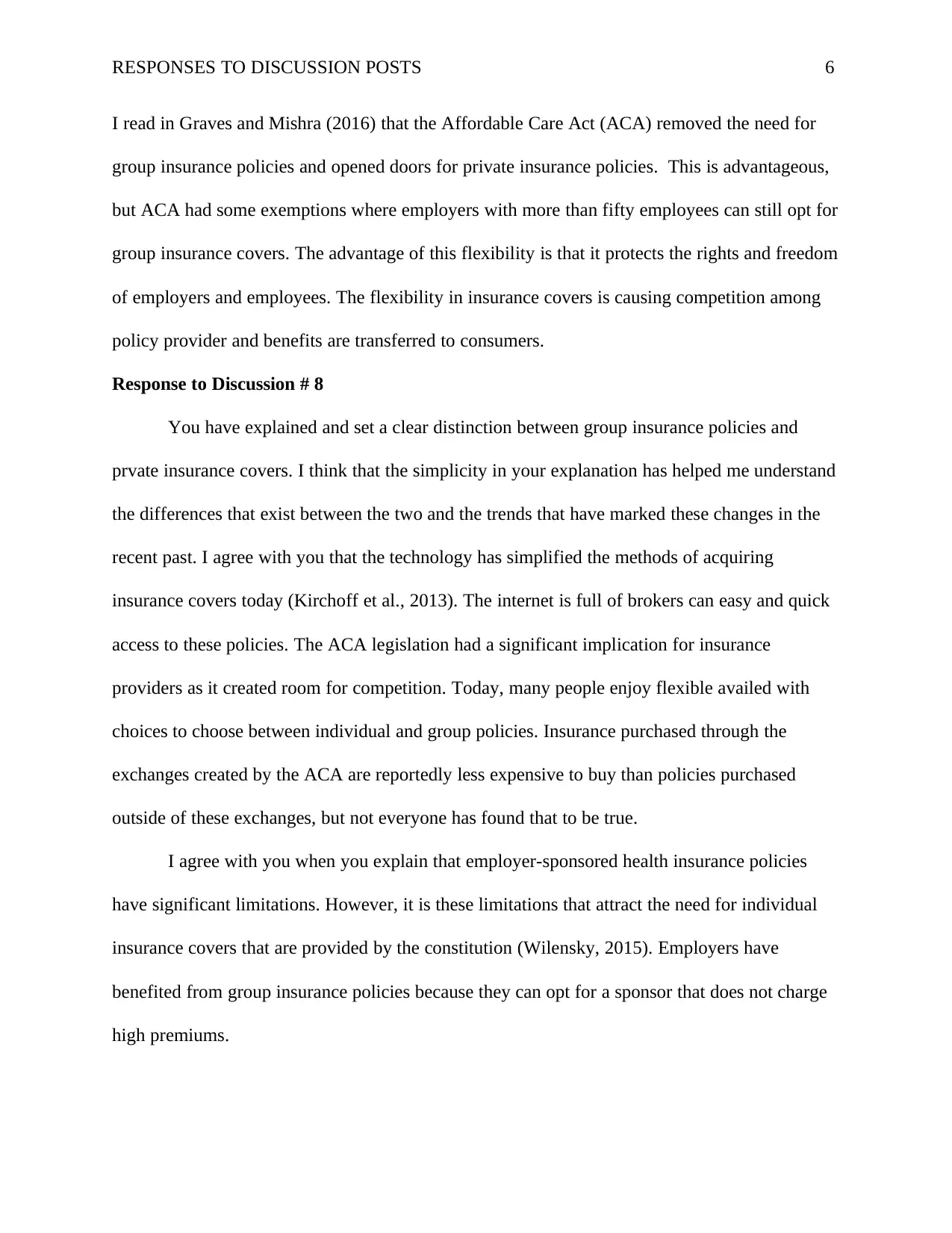
RESPONSES TO DISCUSSION POSTS 6
I read in Graves and Mishra (2016) that the Affordable Care Act (ACA) removed the need for
group insurance policies and opened doors for private insurance policies. This is advantageous,
but ACA had some exemptions where employers with more than fifty employees can still opt for
group insurance covers. The advantage of this flexibility is that it protects the rights and freedom
of employers and employees. The flexibility in insurance covers is causing competition among
policy provider and benefits are transferred to consumers.
Response to Discussion # 8
You have explained and set a clear distinction between group insurance policies and
prvate insurance covers. I think that the simplicity in your explanation has helped me understand
the differences that exist between the two and the trends that have marked these changes in the
recent past. I agree with you that the technology has simplified the methods of acquiring
insurance covers today (Kirchoff et al., 2013). The internet is full of brokers can easy and quick
access to these policies. The ACA legislation had a significant implication for insurance
providers as it created room for competition. Today, many people enjoy flexible availed with
choices to choose between individual and group policies. Insurance purchased through the
exchanges created by the ACA are reportedly less expensive to buy than policies purchased
outside of these exchanges, but not everyone has found that to be true.
I agree with you when you explain that employer-sponsored health insurance policies
have significant limitations. However, it is these limitations that attract the need for individual
insurance covers that are provided by the constitution (Wilensky, 2015). Employers have
benefited from group insurance policies because they can opt for a sponsor that does not charge
high premiums.
I read in Graves and Mishra (2016) that the Affordable Care Act (ACA) removed the need for
group insurance policies and opened doors for private insurance policies. This is advantageous,
but ACA had some exemptions where employers with more than fifty employees can still opt for
group insurance covers. The advantage of this flexibility is that it protects the rights and freedom
of employers and employees. The flexibility in insurance covers is causing competition among
policy provider and benefits are transferred to consumers.
Response to Discussion # 8
You have explained and set a clear distinction between group insurance policies and
prvate insurance covers. I think that the simplicity in your explanation has helped me understand
the differences that exist between the two and the trends that have marked these changes in the
recent past. I agree with you that the technology has simplified the methods of acquiring
insurance covers today (Kirchoff et al., 2013). The internet is full of brokers can easy and quick
access to these policies. The ACA legislation had a significant implication for insurance
providers as it created room for competition. Today, many people enjoy flexible availed with
choices to choose between individual and group policies. Insurance purchased through the
exchanges created by the ACA are reportedly less expensive to buy than policies purchased
outside of these exchanges, but not everyone has found that to be true.
I agree with you when you explain that employer-sponsored health insurance policies
have significant limitations. However, it is these limitations that attract the need for individual
insurance covers that are provided by the constitution (Wilensky, 2015). Employers have
benefited from group insurance policies because they can opt for a sponsor that does not charge
high premiums.
⊘ This is a preview!⊘
Do you want full access?
Subscribe today to unlock all pages.

Trusted by 1+ million students worldwide
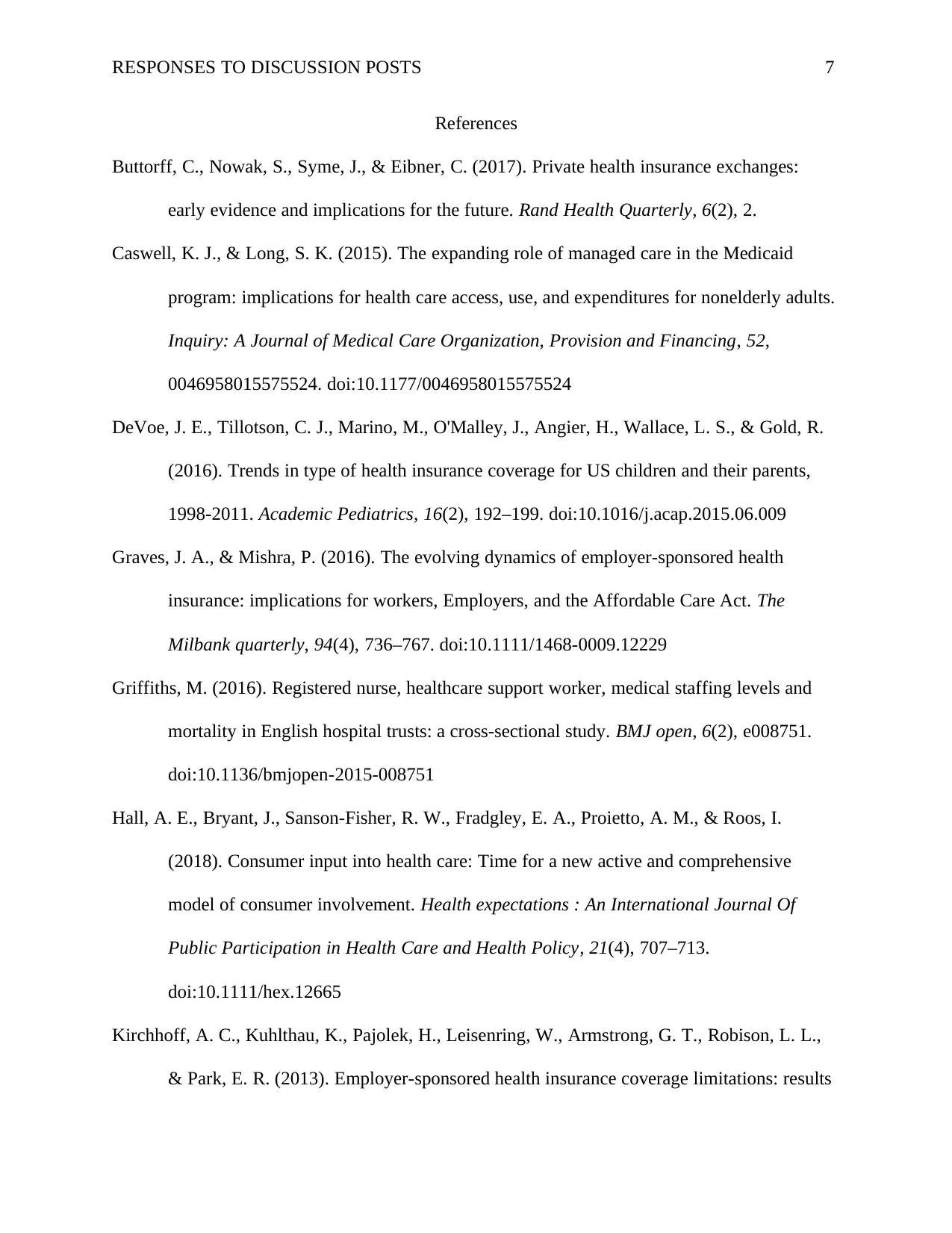
RESPONSES TO DISCUSSION POSTS 7
References
Buttorff, C., Nowak, S., Syme, J., & Eibner, C. (2017). Private health insurance exchanges:
early evidence and implications for the future. Rand Health Quarterly, 6(2), 2.
Caswell, K. J., & Long, S. K. (2015). The expanding role of managed care in the Medicaid
program: implications for health care access, use, and expenditures for nonelderly adults.
Inquiry: A Journal of Medical Care Organization, Provision and Financing, 52,
0046958015575524. doi:10.1177/0046958015575524
DeVoe, J. E., Tillotson, C. J., Marino, M., O'Malley, J., Angier, H., Wallace, L. S., & Gold, R.
(2016). Trends in type of health insurance coverage for US children and their parents,
1998-2011. Academic Pediatrics, 16(2), 192–199. doi:10.1016/j.acap.2015.06.009
Graves, J. A., & Mishra, P. (2016). The evolving dynamics of employer-sponsored health
insurance: implications for workers, Employers, and the Affordable Care Act. The
Milbank quarterly, 94(4), 736–767. doi:10.1111/1468-0009.12229
Griffiths, M. (2016). Registered nurse, healthcare support worker, medical staffing levels and
mortality in English hospital trusts: a cross-sectional study. BMJ open, 6(2), e008751.
doi:10.1136/bmjopen-2015-008751
Hall, A. E., Bryant, J., Sanson-Fisher, R. W., Fradgley, E. A., Proietto, A. M., & Roos, I.
(2018). Consumer input into health care: Time for a new active and comprehensive
model of consumer involvement. Health expectations : An International Journal Of
Public Participation in Health Care and Health Policy, 21(4), 707–713.
doi:10.1111/hex.12665
Kirchhoff, A. C., Kuhlthau, K., Pajolek, H., Leisenring, W., Armstrong, G. T., Robison, L. L.,
& Park, E. R. (2013). Employer-sponsored health insurance coverage limitations: results
References
Buttorff, C., Nowak, S., Syme, J., & Eibner, C. (2017). Private health insurance exchanges:
early evidence and implications for the future. Rand Health Quarterly, 6(2), 2.
Caswell, K. J., & Long, S. K. (2015). The expanding role of managed care in the Medicaid
program: implications for health care access, use, and expenditures for nonelderly adults.
Inquiry: A Journal of Medical Care Organization, Provision and Financing, 52,
0046958015575524. doi:10.1177/0046958015575524
DeVoe, J. E., Tillotson, C. J., Marino, M., O'Malley, J., Angier, H., Wallace, L. S., & Gold, R.
(2016). Trends in type of health insurance coverage for US children and their parents,
1998-2011. Academic Pediatrics, 16(2), 192–199. doi:10.1016/j.acap.2015.06.009
Graves, J. A., & Mishra, P. (2016). The evolving dynamics of employer-sponsored health
insurance: implications for workers, Employers, and the Affordable Care Act. The
Milbank quarterly, 94(4), 736–767. doi:10.1111/1468-0009.12229
Griffiths, M. (2016). Registered nurse, healthcare support worker, medical staffing levels and
mortality in English hospital trusts: a cross-sectional study. BMJ open, 6(2), e008751.
doi:10.1136/bmjopen-2015-008751
Hall, A. E., Bryant, J., Sanson-Fisher, R. W., Fradgley, E. A., Proietto, A. M., & Roos, I.
(2018). Consumer input into health care: Time for a new active and comprehensive
model of consumer involvement. Health expectations : An International Journal Of
Public Participation in Health Care and Health Policy, 21(4), 707–713.
doi:10.1111/hex.12665
Kirchhoff, A. C., Kuhlthau, K., Pajolek, H., Leisenring, W., Armstrong, G. T., Robison, L. L.,
& Park, E. R. (2013). Employer-sponsored health insurance coverage limitations: results
Paraphrase This Document
Need a fresh take? Get an instant paraphrase of this document with our AI Paraphraser
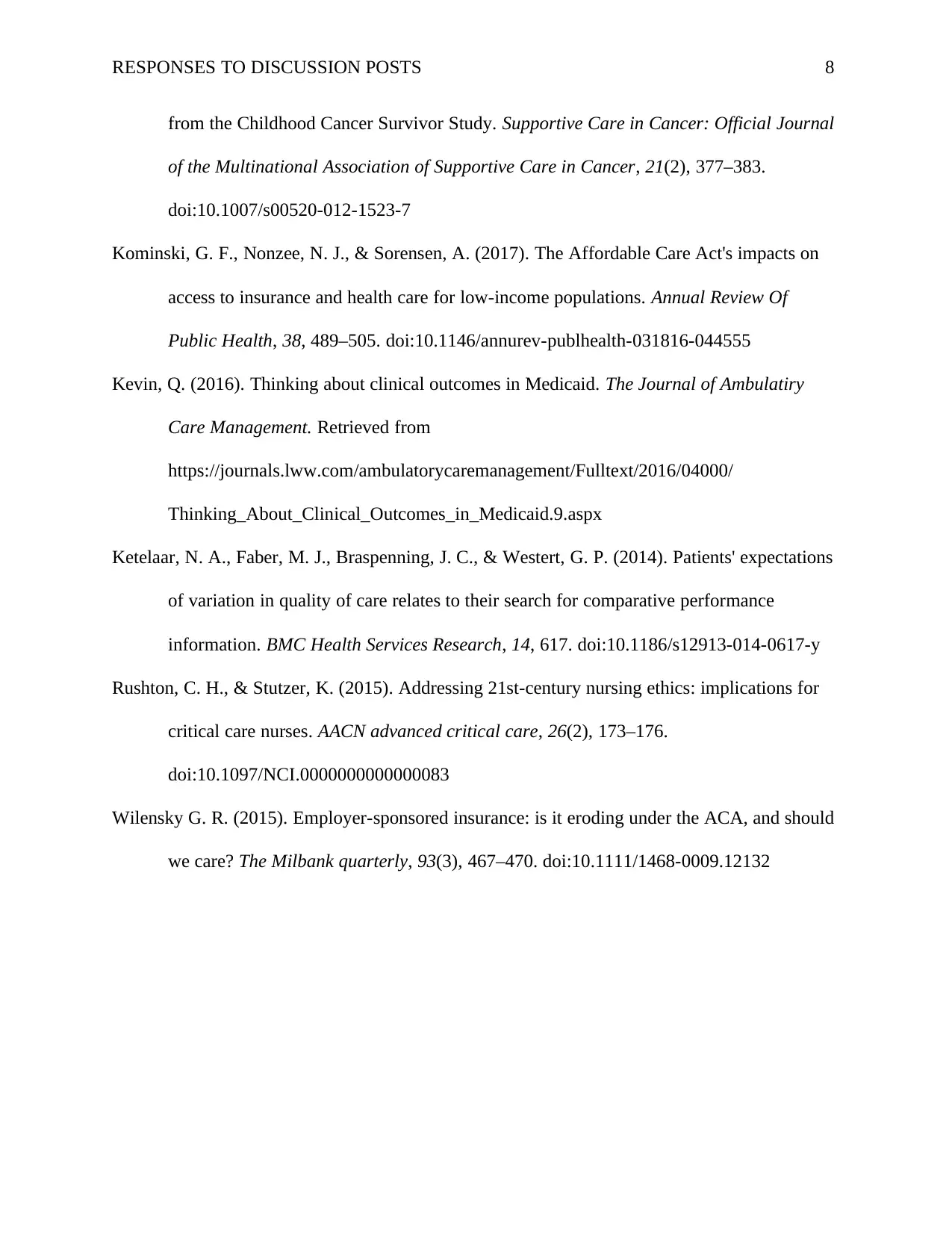
RESPONSES TO DISCUSSION POSTS 8
from the Childhood Cancer Survivor Study. Supportive Care in Cancer: Official Journal
of the Multinational Association of Supportive Care in Cancer, 21(2), 377–383.
doi:10.1007/s00520-012-1523-7
Kominski, G. F., Nonzee, N. J., & Sorensen, A. (2017). The Affordable Care Act's impacts on
access to insurance and health care for low-income populations. Annual Review Of
Public Health, 38, 489–505. doi:10.1146/annurev-publhealth-031816-044555
Kevin, Q. (2016). Thinking about clinical outcomes in Medicaid. The Journal of Ambulatiry
Care Management. Retrieved from
https://journals.lww.com/ambulatorycaremanagement/Fulltext/2016/04000/
Thinking_About_Clinical_Outcomes_in_Medicaid.9.aspx
Ketelaar, N. A., Faber, M. J., Braspenning, J. C., & Westert, G. P. (2014). Patients' expectations
of variation in quality of care relates to their search for comparative performance
information. BMC Health Services Research, 14, 617. doi:10.1186/s12913-014-0617-y
Rushton, C. H., & Stutzer, K. (2015). Addressing 21st-century nursing ethics: implications for
critical care nurses. AACN advanced critical care, 26(2), 173–176.
doi:10.1097/NCI.0000000000000083
Wilensky G. R. (2015). Employer-sponsored insurance: is it eroding under the ACA, and should
we care? The Milbank quarterly, 93(3), 467–470. doi:10.1111/1468-0009.12132
from the Childhood Cancer Survivor Study. Supportive Care in Cancer: Official Journal
of the Multinational Association of Supportive Care in Cancer, 21(2), 377–383.
doi:10.1007/s00520-012-1523-7
Kominski, G. F., Nonzee, N. J., & Sorensen, A. (2017). The Affordable Care Act's impacts on
access to insurance and health care for low-income populations. Annual Review Of
Public Health, 38, 489–505. doi:10.1146/annurev-publhealth-031816-044555
Kevin, Q. (2016). Thinking about clinical outcomes in Medicaid. The Journal of Ambulatiry
Care Management. Retrieved from
https://journals.lww.com/ambulatorycaremanagement/Fulltext/2016/04000/
Thinking_About_Clinical_Outcomes_in_Medicaid.9.aspx
Ketelaar, N. A., Faber, M. J., Braspenning, J. C., & Westert, G. P. (2014). Patients' expectations
of variation in quality of care relates to their search for comparative performance
information. BMC Health Services Research, 14, 617. doi:10.1186/s12913-014-0617-y
Rushton, C. H., & Stutzer, K. (2015). Addressing 21st-century nursing ethics: implications for
critical care nurses. AACN advanced critical care, 26(2), 173–176.
doi:10.1097/NCI.0000000000000083
Wilensky G. R. (2015). Employer-sponsored insurance: is it eroding under the ACA, and should
we care? The Milbank quarterly, 93(3), 467–470. doi:10.1111/1468-0009.12132
1 out of 8
Related Documents
Your All-in-One AI-Powered Toolkit for Academic Success.
+13062052269
info@desklib.com
Available 24*7 on WhatsApp / Email
![[object Object]](/_next/static/media/star-bottom.7253800d.svg)
Unlock your academic potential
Copyright © 2020–2025 A2Z Services. All Rights Reserved. Developed and managed by ZUCOL.





